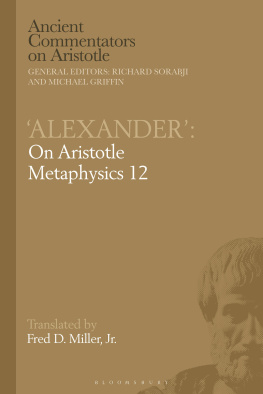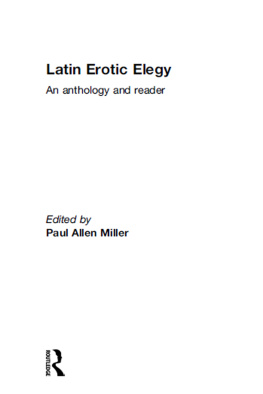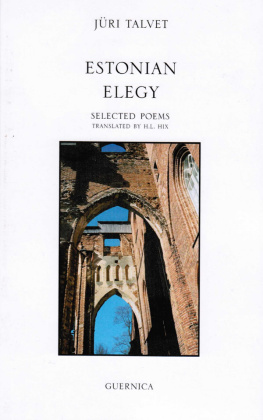THE
Elegies
OF
Maximianus

THE
Elegies
OF
Maximianus

Edited and translated by
A. M. Juster
Introduction by
Michael Roberts

Copyright 2018 University of Pennsylvania Press
All rights reserved. Except for brief quotations used for purposes of review or scholarly citation, none of this book may be reproduced in any form by any means without written permission from the publisher.
Published by
University of Pennsylvania Press
Philadelphia, Pennsylvania 19104-4112
Printed in the United States of America on acid-free paper
10 9 8 7 6 5 4 3 2 1
Library of Congress Cataloging-in-Publication Data
Names: Maximianus, active 6th century, author. | Juster, A. M., editor, translator. | Roberts, Michael, writer of introduction. | Container of (expression): Maximianus, active 6th century. Elegiae. | Container of (expression): Maximianus, active 6th century. Elegiae. English
Title: The elegies of Maximianus / edited and translated by A. M. Juster ; introduction by Michael Roberts.
Description: 1st edition. | Philadelphia : University of Pennsylvania Press, [2018] | Bilingual; text in Latin and English; includes substantial annotations in English. | Includes bibliographical references.
Identifiers: LCCN 2017033938 | ISBN 978-0-8122-4979-8 (hardcover : alk. paper)
Classification: LCC PA6511.M6 A2 2018 | DDC 871/.02dc23
LC record available at https://lccn.loc.gov/2017033938
Contents
by Michael Roberts
My goal with this book is to provide a faithfulbut not literaltranslation that also works as poetry. I try to replicate the feel of the Latin elegiac distich with couplets in alternating iambic hexameter and iambic pentameter while allowing myself the customary substitutions of formal poetry in English. When possible, I imitate Maximianuss pronounced internal rhyme, alliteration, and assonance, all of which are much more common in Late Antiquity than in the classical era. I also try to mimic his love of the spondee. (See Cupaiuolo 1997 at 381.)
The commentary is the only one in English other than the Webster edition of 1900. I try to explain facets of the text that might be unclear to a reader while also conceding confusion on many points in the hope of spurring future scholarship. Those concessions are important because I believe too much of the scholarship has stifled debate by interpreting the text rigidly rather than acknowledging its intentional and unintentional ambiguities.
No scholar has comprehensively traced the reception of the elegies in later literature, and I do not try to do so myself, but I note some instances of Maximianuss influence, again in the hope of spurring future scholarship. I include the Imitatio Maximiani and Le regret de Maximian for that same reason but leave translation of those texts to interested scholars. I want to bring Maximianus to as wide an audience as possible, so I also include some notes that are unnecessary for classics scholars but possibly helpful to academics and students still refining their Latin.
Most textual analysis of the elegies ended over a century ago with the very different editions of Baehrens and Webster. Although Websters commentary is frustratingly erratic, his editorial choices are far more cautious and thoughtful than those of Baehrens. Baehrenss editing reflects to a greater extent the late nineteenth-century bias toward aggressive emendations motivated by a misguided desire to classicize the Latin of Late Antiquity. Too much of the Maximianus scholarship of the past century relies on the flawed Baehrens text.
Future research and translations would benefit from a text of Maximianus derived from a new analysis of the many surviving manuscripts, but I am not the right person for that task. Accordingly, I rely on the Webster text as my starting point. When I emend the text, I flag the change with an asterisk and state my reasons for doing so in the notes. For those interested in the manuscript tradition, see Schetter (1970) at 39; Agozzino (1970) at 2327; Spinazz (2011) at 4349, 5261; DAngelo (2005) at 467471. For those who want to consider the many variations in the manuscripts in more detail than I provide in my commentary, I recommend the work of berg (1999) at 8891 and 153183; see also Prada (1918). For comments on the manuscript tradition, I also recommend Perronis review of Schetter (1979 at 144150).
I rejected well-intentioned advice and did not punctuate the text but left it as I believe it stood in the sixth century. Punctuation of texts of Maximianuss elegies has tended to push readers toward the editors often debatable interpretations, and I think it is better to acknowledge uncertainties created by the difficulty of the Latin, the suspect parts of the text, and the poets deliberate ambiguities. In other words, I want to stimulate debate, not stifle it. With the same rationale, I try to highlight disagreements between scholars about the meaning of lines instead of pronouncing a definitive answer where there is uncertainty.
Methods of citation vary greatly. Mine reflects my legal training and should be easy for anyone to follow. Where citations to texts vary, as is the case with Boethius Consolatio philosophiae, I have relied on the choice made by the Monumenta.ch database. For ease of use I have avoided abbreviations except OLD for the 2006 combined edition of the Oxford Latin Dictionary.
Many wonderful people have generously and graciously assisted me with this project. The two anonymous reviewers were painstaking and thoughtful. Aaron Poochigian was the reader of my first draft, and he patiently answered many questions over many years. Roger Green, Julia Hejduk, Joel Relihan, Aaron Pelttari, Anna Maria Wasyl, Cillian OHogan, and Ian Fielding carefully read all or large parts of subsequent drafts. Genevieve Liveley, James Uden, and Patrick McBrine regularly responded to pleas for help as I was wrestling with the text. Robert Kaster provided invaluable assistance tracking down and analyzing epigrams of Maximianus referenced in the literature as well as answering occasional questions about rhetoric. I tapped the expertise in elegy of my former collaborator, Robert Maltby, on several occasions. Mark Tizzoni helped me with questions relating to Eugene of Toledo. Sharon James answered some questions relating to interpretation of certain terms in light of the elegiac tradition. James Adams helped me with several questions related to sexual vocabulary. James ODonnell and Shane Bjorlie rescued me from the unfamiliar prose of Cassiodorus, and Eric Hutchinson was helpful with the Appendix Maximiani. Danuta Shanzer provided helpful input on several points, and Jay Wickersham helped me obtain microfilmed dissertations. Finally, Michael Roberts did a superb job helping me with the final edits, but all mistakes are mine.
I am grateful for the hospitality of the Library of Congress, the Georgetown University Library, Harvard Universitys Widener Library, and the Dumbarton Oaks Library. I am grateful to Eva Oledzka of the Bodleian Library, who helped me on questions relating to the key manuscript for the
Next page










